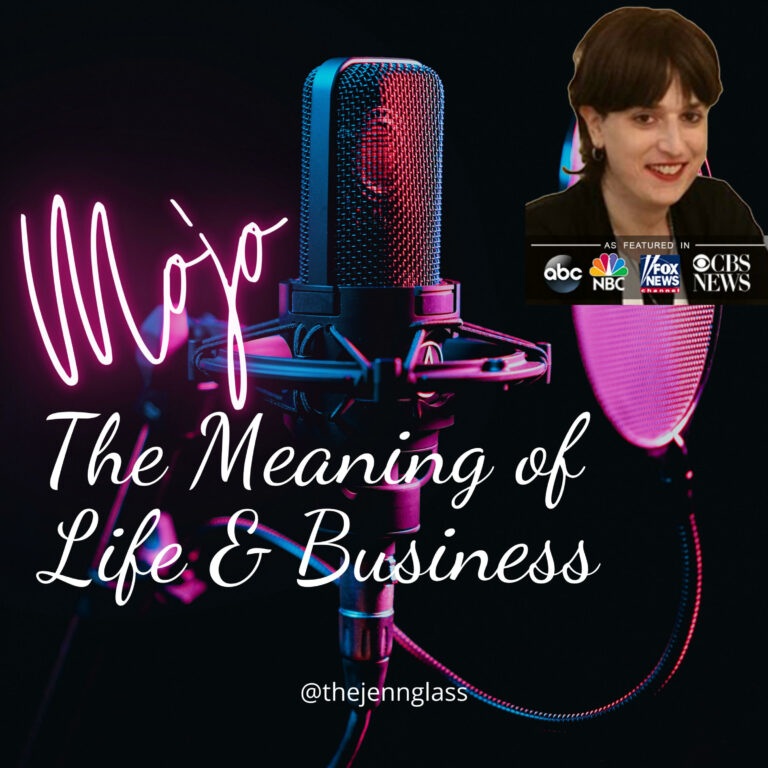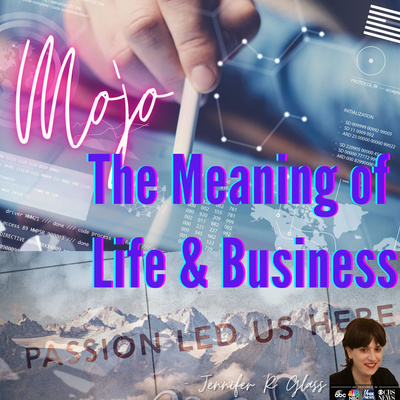Very often, people coming into the business world are taught to Always Be Closing – the “ABC’s” that some people believe you have to do in business. While there are some occasions where such a mantra may be suitable, when creating relationships with people, even the slightest hint of selling can be a big turn-off.
In this episode, Jennifer has a conversation with Dana Friedman from Dragonfly Technologies in New York City where they talk about networking – from the comedic side of networking (with those in showbusiness) to the various groups that are out there and everything in between. You’re sure to learn a lot from this conversation on how to properly network with other professionals.

Life & business intersect in many places. After all, we cannot have a business without looking at the human component of business.
This podcast with Jennifer R Glass, CEO of Business Growth Strategies International & BGSICoaching.com is all about the meaning of life and business & the interesting ways they intersect. The show is for entrepreneurs and aspiring entrepreneurs on the search for what makes people successful and how to get there themselves.
Listen in as Jennifer & her guests dive deep into what makes people tick & how they make their businesses work for the betterment of others.
Very often, people coming into the business world are taught to Always Be Closing – the “ABC’s” that some people believe you have to do in business. While there are some occasions where such a mantra may be suitable, when creating relationships with people, even the slightest hint of selling can be a big turn-off.
In this episode, Jennifer has a conversation with Dana Friedman from Dragonfly Technologies in New York City where they talk about networking – from the comedic side of networking (with those in showbusiness) to the various groups that are out there and everything in between. You’re sure to learn a lot from this conversation on how to properly network with other professionals.
About Dana: With extensive experience in many areas of show business—both the show and the business sides—Dana is most qualified to help small entertainment-industry businesses solve computer and IT-related problems. In 1990, Dana was one of the founding partners of Dragonfly Technologies, to provide creative IT solutions to small businesses.
Among her industry specialties are legal, medical, financial, the building-trades, not-for-profit, and entertainment. Ms. Friedman’s secret to success is to never take anything more seriously than necessary. When not solving small-business IT problems, Dana performs standup comedy, as she has been for the past ten years.
Connect with Dana on LinkedIn or visit her website, Dragonflytech.com

Transcript (automatically generated and may contain errors)
Hello, and welcome to another episode of mojo, the meaning of life and business podcast on today’s program. We’re going to be talking about networking. A lot of you go to networking events, especially in a world before COVID. There were many live events that we were going to where we were going, and we were seeing people, many people would come up to you and say, what do you do?
And give you a business card and then they move on and then go to the next person and the next person, the next person. And one of the problems of networking with the old way or idea of networking is that you’re never creating relationships. And so it’s really important to be a good networker or a good relationship worker.
As you look at what we’re doing in. And in life because networking is not only for business people. And so I have a really cool guest today on the program. Her name is Dana Friedman. Who’s going to tell us all about networking or relationship working, but before I bring Dana in, let me tell you a little bit about her.
So with extensive experience, in many areas of showbiz, Both the show and the business sides Dana’s most qualified to help small entertainment industry businesses solve computer and IT related problems. In 1990, Dana was one of the founding partners of Dragonfly Technologies to provide creative it solutions to small businesses among her industry specialties or legal medical, financial, the building trades, nonprofit and enterprise.
Industries Ms. Friedman’s success is to never take anything more seriously than necessary when she’s not solving small business IT problems. Dana performed stand comedy as she’s been doing for the past 10 years. Welcome Dana to the show.
Hi, thanks Jenny. Absolutely. Absolutely. My pleasure.
So Dana, first of all, you’ve got a really interesting and a collective experience, I’ve known you now for about what 15 years give or take in that time. It’s been an incredible experience getting to know you, seeing where you’ve gone and all the things that you’ve been doing. And as you certainly have been, I mean, um, for 31 32 years now, you’ve had your business. It’s definitely been, you know, quite some time.
And you’ve had your share of networking. So let me ask you, when you started in 1990 and your networking, what did it mean to you then? And what does it mean to you now? Oh, my God, I didn’t know what networking was in 1990. I was, uh, I got into my business by accident. I was one of four partners. The other three had actual experience in it.
And I had been at a day job in which I had, uh, worked with computers a bit. And the other three partners had worked with computers, the size of a brownstone building. And, uh, I had worked on the ones on the desktops and done kind of basic administrative things. And the other three partners said, well, you can be our little computers person, a little computers, you know?
Yes. I was. Right. I was the little computers person. Then you have to figure out where to hyphenate that. Cause it could mean very different things depending on whether it’s little computers or computers person regardless. Um, so yeah, there, I was learning from these amazingly senior people each with about 15 to 20 years experience and I with nothing in professional, it just kind of some basic second level support.
In other day jobs in the entertainment industry. Um, and one of the things that I found out is that the contracts, uh, for computers, the size of a brownstone building take a year or more to close and a small business using the little computers need help immediately. And there’s really not much of a sales site.
Um, and eventually, especially in 1990, when the users did not feel empowered and computers were harder to use, people needed help. They knew that quick, uh, and they needed a friendly, um, and so I relied on community resources, uh, at the time that meant sorta LGBT and friends and friends of LGBT people. And, um, And word got out.
And one of the mistakes that we made, uh, sorta early on is that we advertised and in advertising, Jenny, in your experience, when someone calls from an ad, what’s the first question they asked.
Yes. Now that’s an important question to ask, but you shouldn’t ask it first. The first thing, the first thing someone should want to know is can you fix my problem? Uh, and they don’t ask that first. And so eventually. Uh, well in, well, at the end of 1994, uh, the senior technological mentor for all of us, got an offer from a major financial company to be like six then command.
And it was for a salary that. Ciocca horse. So of course we wished them well, cause you know, he had kids in private school and mortgage and you know, we, weren’t doing very much business except for the, except for the little computer stuff, which is what the three senior people didn’t want. A part of. It was the oldest.
I was the only one booking work and not because they were bad at it, just because it takes a very long time. And you know, sales is a numbers game, uh, and. Uh, you have to have a pretty big set of resources to land one of those big contracts. Uh, and mine weren’t contracts. Mine were per service. Let’s get it over with quickly and fix problems.
Um, and in 1995 we tried an ad for kind of a specialty thing. And of course, everybody asks how much first and yeah, we were expensive, but, and. Uh, I had taken some sales training and the only real thing I got out of that, most of it, you know, you separate the wheat from the chaff in any training. And the primary thing that I learned, uh, is to ask question, because when you ask questions, you get at the heart of what they really want, what they say they want.
Isn’t always what they really need. So if you’re a professional. In your industry. One of the things you’ll find out is what they really need, or what on the basis of asking questions. If you tell them things, you could be lying. If they say it’s the God, it’s the gospel. So, um, at the end of 1997, I was, I was alone.
Uh, the, the. The two other partners had left cause I had nothing to teach them and I was the only one booking work. Uh, so I was booking subcontractors. Um, and in 1997 I actually hired my first person and stopped advertising. And at the beginning of 1998, uh, I went to my first business networking group, which is really the only, which is the, I guess the primary one I’ve been involved in always be.
Which is an international networking organization. Um, and because they only allowed one person per profession in every chapter, they have 6,000 chapters or more worldwide now. Uh, but with only one person per profession, uh, the meetings every week were such that w were great. Cause nobody got up to compete for business.
One should have more than one source of networking. Um, but uh, having joined my first BNI chapter in 1998, I’m currently working on 10th and 11th generation referrals. Meaning the people who referred me, referred me to somebody else and they told two friends and they told two friends like the old shampoo commercial from a hundred years ago.
Um, uh, now I forgot the original question. Oh,
okay. So, um, networking in business. So I didn’t know anything. Uh, BNI taught me a lot. Uh, and over the course of the years, I realized even before BNI, I realized that you have to use every channel available to you. Um, To uh, to increase your prospect base. And, uh, once you get to know a lot of people and become the go-to person for a lot of things, once people, once people find out, you know, stuff and, you know, people, they will come to you for things that you, in, which you’re not an expert, just because, you know, Hey, you know, everybody.
You know, can you find me a chiropractor? Well, sure. There’s even one of my BNI chapter. Um, and so I would make an introduction and sometimes it worked and sometimes it didn’t, but the fact that I was the go-to person who knew someone, they kept coming back and eventually, uh, that ended up in a referral of some kind, uh, and one should use every.
Social and business channel available to be the go-to person and always be ready to do a favor for someone because they’ll remember it. Um, and that’s how we got started. Uh, that’s how I discovered networking. Um, hopefully after many years of BNI I’ve become good at it. Um, but that’s how it starts. Um, Uh, we were going to focus on the creatives.
You know what, I’ve talked a lot, you probably have a follow-up question or 30, right? So first of all, I love how, you know, things, you know, stuff. I love that line. Um, and it’s really true because when you know people and when you’re in the business of relationship, Right. I mean, one thing that one of my mentors says, you can be a chiropractor.
You can be an it specialist. You can be a doctor, you can be an attorney. You’re not those things. You’re in the business of marketing those things. And you’re also in the business of connecting people. Because no matter how you look at it, everything is about connections. Everything is about relationships and everything is about having a seat at the table.
When somebody wants to have a conversation where you can possibly be a connected dots, kind of person to help ultimately bridge the gap and get to where you want to go. Let me just ask you as it relates to the creative side of. The show business, world and networking. And you run in a lot of those circles.
How is networking different in those circles from your it side? Uh, that’s a whole different universe. Um, creative. People in the arts, people who produce art of one kind or another whether performance or, um, or visual, um, they tend to be very introspective into, into themselves, into their art and, um, dealing with other people.
Is kind of an annoyance out of necessity. Musicians are sort of the exception because they often play in groups, but they spend hours and days and years and decades practicing by themselves. So they are used to perfecting their art, uh, in the hopes of working with an ensemble. Um, Comedians just as an example, I mean, comedians will just write, which is a solo effort.
They will perform their own stuff to themselves. And then at horrible places, like open mics where other comedians are coming to hear themselves talk and hopefully get some laughs. Um, and in know. Nobody who nobody gets up on the stage and bears their souls for the amusement of others. Um, isn’t a little bit broken and broken people tend to be dysfunctional, uh, and they tend to be great sources of referrals.
Um, I probably see about 1500 comics either. And you hear about a lot of problems. Uh, I was able to refer to a real estate agent, um, a lovely young man who had a day job and was making money, but being a comedian forgot to pay his rent for three months. Simply forgot. Oops, lovely guy had the money. Wasn’t trying to pull a fast when he just forgot to pay his rent and eventually got evicted or was about to get evicted or just form such a bad relationship with the landlord that he had to.
Um, so I called up my real estate agent friend, who was mostly into sales, but how did junior person who would do a rental in Brooklyn? And she took care of them? Um, uh, I was really surprised that, um, I helped the comedian get a mortgage. With the mortgage broker in one end and our BNI chapter comedian comedians, I actually have credit good enough to get a decent mortgage, uh, is usually, uh, usually, uh, oh, well, it’s not a usual thing.
It’s unusual. Um, so it was nice to be able to do. Uh, for folks, uh, the more dysfunctional they are, the more they don’t realize they need things. And when it’s pointed out to them, when they, when they talk about, oh yeah, everything’s fine. Except my wrist hurts. I’m like, well, really. Have you thought about going to a doctor?
Do you have health insurance? And again, you ask questions to solicit. And for it to get information, and sometimes you can refer them to a clinic or somebody who takes Medicaid. Or if you, if you know a lot of people, you can get them hooked up. Um, in one case I got somebody to a social worker who helped them get on Medicaid, um, musicians, uh, The higher end professionals are less dysfunctional.
Uh, but they need help. They’re not, no, not all of them. That’s a generalization of course. Um, but creatives are a little more into themselves and therefore, uh, might need a little push and sometimes may need to be brought to realize, uh, they might need things. Uh, Musicians and comedian friends, I know might occasionally need to be reminded to change their clothes from day to day, but you know what, it’s tricky for mind, but you know what, it’s also a thing with, uh, programmers with software developers.
Um, My partner put it very well, uh, about coders. Um, she said that, um, one way to summarize them is slip the pizza under the door and go away. Absolutely. Sometimes you know that they’re going to be there. Yes. You know, it’s funny though, that you mentioned open mikes and, um, the dysfunctionality and I mean, I can tell you that.
There’s a school of thought, actually that a lot of professionals and entrepreneurs, especially should try open mics just to get out of their comfort zone, because it actually helps you think more on your feet and it allows you to respond to people in a completely different way. Are you prepared to say, though, if you don’t have anything prepared to say.
Then you’re going to get no response and people are going to stare at their phones and you’re going to feel you’re going to feel very bad. So they better prepare something to say first, if they go to an open mic, right, I’ve done it where I’ve gone to.
When I’ve gone to open mikes with comedy, I’ve used a couple of things. I mean, one of the jokes I’ll just quickly share with everyone listening. Um, you know, because I was flying so much, eventually I started hearing every time I heard certain sounds, I went to the doctor and I said, listen, I’m hearing these sounds.
I keep thinking I’m on a plane. And the doctors said, you’re not crazy. You’re just flight.
Yes. I mean, there’s been a couple of those things, you know, I’ve been doing these, um, little open mics. It helps from time to time in terms of just getting out of your comfort zone. One of the biggest things I coach my clients on all the time is that in order to change, you have to get out of your comfort zone.
And so that’s where these open mics really make a difference because it allows you to see. Seeing things in a different light, but let me ask you going back to the relationships, going back to networking. If you’re going to be talking to somebody who’s just starting out in business now, what is something that they really need to know about networks?
Some of the things that they should stay away from. And some of the things that may make sense for them to really be paying attention to as they start their journey on entrepreneurship, professionalism, whatever it is that they’re doing. Um, let’s assume for the moment that the person is younger recently out of college or grad school, someone in their twenties.
I hate to sound like this. I hate to sound like the old curmudgeonly lady, but the first thing they have to realize is that they’re, they’re going into business. They’re going into business to help other people. It’s not about them. It’s never about them until it’s time to get paid. Even then. It’s not really about them.
It’s about having performed a service for someone else and getting rewarded for your efforts and helping someone else. But it’s never a bad. You the entrepreneur, it’s always about the other person. What do you need? How can I help? And it doesn’t have to necessarily be about your profession. Uh, it can be about anything, be ready to help going in the door, go in with a positive attitude, um, and know your field very, very well.
Uh, before you purport to help people, or if you don’t know much. Um, set an expectation of what you’re able to do. Uh, but again, it’s not about you. It’s about their needs. Feel free to refer someone else. If you feel that the customer is, or the prospect is a good potential customer later, consider a way to subcontract other talent to work under your auspices.
Uh, You’ll need to talk to your insurance person. Um, but if your primary objective is to help people and be honest and forthright with them, um, your intentions will, we’ll probably. your intentions and your attitude will probably go a long way. Even if you can’t fix their problem. If you find a way to help them fix their problem, even if you’re not the one doing it, they’re going to remember you favorably, assuming they’re nice people.
Absolutely. And you know, you bring up a great example of, um, where reciprocity ultimately. And this is one thing that I’ve been doing for really, really long time, where, when I meet somebody for the first time out events, I’ll ask them, tell me more about what it is you’re trying to do this year. I’m not asking them what they do.
I’m not asking them any of that because 99% of the time you can tell exactly what it is they do by the name of the company. They weren’t. Right. They worked for Merrill Lynch. You know, they’re a financial advisor. They work for such and such accounting firm. You know, they’re an accountant, they worked for this such and such a law firm.
You know, they’re either an attorney paralegal or someone in the, um, support side. A lot of times there’s those kinds of people where I may be able to help. I may not be able to help. What I do to start the conversation, because I want to be contrary, everybody else is going up and saying, what do you do?
Because we’re trying to listen for a buzzword, how can I jump in and offer my services? And so they’re not really interested in the relationship. They’re interested in the. And there are certain people that I know that that’s the only thing that they go in for. I hear from this one person in particular, oh, I went to these groups and I never get any business from it.
And I asked this one person. I said, when you go to the groups, are you going in with a, I want to help mentality? Or are you going in with. Gimme gimme, gimme mentality. And if you’re doing that, gimme, gimme, gimme, you’re going to walk out empty handed because people are going to see three through it. But when I asked, so what are some of the top things you want to get done this year?
Very often I’ve actually referred Fiverr or Upwork or a VA marketplace that I work with because those places. Directly address what a lot of these people need. Yep. And so when you think about it, I have absolutely no connection to Fiverr, to Upwork or these other organizations, you know, with the VA marketplace, I have an affiliate relationship with them.
So yeah, maybe I have a little financial incentive, but it’s still, I’m not really connected at the end of the. If it works out great. If it doesn’t, it’s absolutely no skin off my back in terms of what’s actually happening with the process. Right. And so when you look at it, in that perspective, things really start to be dramatically different when you offer that.
And so if somebody says, well, I’m just starting out in business, I’ve got a shoestring budget and I need a, B and C done. Well, I know for me, I may not be able to directly address that, but here’s a couple of people that you can talk with. I’m also as an ambassador for the small business development center, I very often refer the SBDC as a partner with score I’ve referred score, and there’s a lot of these organizations that are there that allow small businesses to start getting the resources that they need is.
And so when you think about all of the opportunities you have, think about where you can go, even if it’s not directly related to you. Because as Dana was saying, at some point down the road, they may become a client of yours. And they’re going to appreciate that you didn’t take advantage of them in the beginning.
Yeah.
Contrarian type or contrary type thing that I do, um, is to ask them in what way they’re different from everybody else who does what they do. And they might say something that’s really memorable. Like, uh, I only work with women over 80 depending on their profession, like, oh, great. Well, um,
Uh, well, whatever fine. Let’s just, let’s just go with that. Um, if your grandmother happens to need that service or grandma has, you know, in her bridge club or her book club, um, a bunch of people who. Might need that service. There you go. You got to channel and you’re, you’re 20 something entrepreneur, if they’re nice and they’re competent at what they do, um, has a prospect base that’s unusual.
And if they were to just say, uh, well, I’m a, whatever. I run a, I run a cleaning service. That’s a little strange, a cleaning service that worked for or whatever, but special. Maybe they have a specialty of, uh, old retired women. I don’t know why they would. It’s just an example out of thin air. Um, but it’s memorable.
Um, One of the accountants. We work with specializes in music royalties, and that’s becoming a very, very complicated sub-niche. Um, and so one of my friends, uh, is being ripped off by one of the major streaming organizations, streaming businesses. Uh, and so I set the two of them up. The accountant right away said you can’t afford me.
Well, all right. At least we tried. We set up the specialty person would be person with, you know, with the person who had the need to fit that sub niche. So knowing people in sub niches and finding out the particulars of what they do and how they’re different from everybody else, um, is great. Also your go-to person, isn’t always the right person for the job.
Your accountant might be. For you, um, but may not necessarily know the ins and outs of, um, farming, but you have to. Yeah. If you happen to meet a farmer from say, whatever, upstate New York, um, you might want an account, who’s got a specialty there and if you know, one who’s honest and competent. Knowing your sub-niche has helps.
Absolutely. It always helps to be thinking about where you can be going in a way that’s going to be making sense when you’re working with different people. So as we think about the business side of things, where you are today and where you want to be say in two, three years, Where do you see yourself being you as an entrepreneur, you as dragon flight technologies, you as the comedy that you’re doing, where do you see yourself?
Well, the industry is changing very, very quickly. Um, I hope two years from now to be very much in a back seat management. Only, not in the field. Position, um, working with the junior people in the field and being sort of the senior delegate tricks. That’s delegator sort, sorry. Ava tricks, delegate tricks, et cetera.
Um, I mean, I’m sort of doing that now to you. I, I tell some of my customers that they’re not, they’re not always going to see me. I use a metaphor from another industry and I tell them I’m the Madam, um, Interesting way of putting it. It gets their attention. Um, I tell them on the Madam and sometimes they need a working Madam meaning the Madam who’s still on the street.
Sometimes they need to see the boss or the senior person, and I’m always happy to help when I’m needed, but I’m usually not needed. Uh, what was the old thing? Work on the business? Not in the business. Yeah, I’ve always tried to do that. Um, also, cause I’m lazy and I would prefer not to leave the house if I don’t have to.
That’s a joke. Um, uh, but if I can solve a problem, you know, from bed and help three people in an hour, rather than one person in two hours, I’d much rather do that. Uh, I’d much rather have my employees do that. Uh, but I definitely hope to be in much more of a back seat, uh, capacity sort of, uh, leading from behind if you will.
Absolutely. And so Dana, as we wrap up our conversation on networking on relationships on. Ways to get new business.
It’s definitely been a lot of information that we’ve covered and I strongly recommend for all of you listening, go back and review this episode because we did talk about a lot of ways that you can earn people’s trust in. And ultimately have an opportunity down the road at reciprocity, kicking back in for you to have a chance at getting the business, or at least them wanting to refer people to you, as opposed to just doing the gimme.
Gimme, gimme, well, I’m sorry. Finished wrapping up. Just have one more thing for you. Okay. This is sort of, this is also contrary. When you start out, you should not be in business to make money. You should be in business. I mean, you have to make money, but, um, in just about every industry, you’re able to divide the people who are.
Greedy and dishonest and looking after for themselves first versus those who are passionate about helping their customers, even if it means losing or not making as much money as the other people, uh, in my industry, um, most of the folks have moved to what’s called a managed services model. And that means that, uh, The customer pays them X every month for an all you can eat budget.
That means the consultant gets paid, whether they work or not. Uh, and so they do as much upfront to make sure they do as little as possible to earn their monthly keep. Uh, and then they have quote unquote recurring revenue and that’s lovely for them, but I deal with that same customer and they end up getting everything they need for less money.
Um, uh, and the small businesses appreciate it. Uh, the ones who really need that sort of service, I’m happy to give it to them, but, you know, find out what they need and give it to them, even if you could make more money selling them something else. And if you let them know that, uh, or they’ve compared when they see your doing what’s right for them, rather than what’s better for you.
They’re going to appreciate it. And when you really need to spend money, they’re going to be a lot less hesitant to do so, because they’re going to trust you. Absolutely. And so, Dana, let me ask you, how can people find out more about you? Um, well, uh, for the, for the it side dragonflytech.com dragon fly T E C H dot.
Uh, or Dana after Agon flight tech.com. If you just want to write, um, for the comedy side, [email protected] the website, um, that’s a start.
Thank you. And that’s Dana F R I E D M a n.com for those that are listening and we’ll include that in the. Description as well, so that you can get in touch with Dana. And so, as we wrap up our conversation today, think about really what it is that you’re going to do the next time. You’re at a networking event.
The next time you’re going to be seeing prospective clients. And it really doesn’t matter if it’s a formal networking event. If you’re at a holiday party, wherever you are, there’s a lot of things that you can be doing that can allow you to do. Reaching new people and being a resource before you’re the service provider or selling that widget to people.
And so as you think about where you’re going, I strongly encourage you really think about being in a position of give before take, because you’ll eventually got it on that note. Thank you very much, Dana, for being my guest on today’s program. And until next time, this has been another episode of mojo, the meaning of life and business and here’s to your success.
About Dana:
With extensive experience in many areas of show business—both the show and the business sides—Dana is most qualified to help small entertainment-industry businesses solve computer and IT-related problems. In 1990, Dana was one of the founding partners of Dragonfly Technologies, to provide creative IT solutions to small businesses.
Among her industry specialties are legal, medical, financial, the building-trades, not-for-profit, and entertainment. Ms. Friedman’s secret to success is to never take anything more seriously than necessary. When not solving small-business IT problems, Dana performs standup comedy, as she has been for the past ten years.
Connect with Dana on LinkedIn or visit her website, Dragonflytech.com







